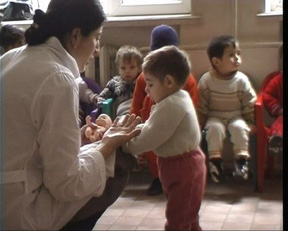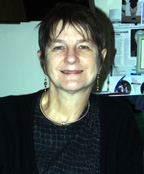Jane Rawls, Ph.D., a child psychologist from New Zealand, today (Dec. 6) will discuss the plight and needs of abandoned, war-traumatized, and physically and developmentally disabled children in ex-Soviet Georgia.
At 11 a.m., she will speak to faculty at the Munroe-Meyer Institute in Room 3016. At noon, she will address members of the Student Alliance for Global Health in Wittson Hall, Room 3037.
 |
Nata Mepharishvili at work with Georgian children. |
“I’ve been friends with Dr. Rawls for years and am proud of MMI for facilitating her visit to Nebraska to promote a wonderful program that is helping thousands of abandoned children in Georgia,” said Judy Mathews, Ph.D., of MMI’s department of psychology. Dr. Mathews is a long-time colleague of Dr. Rawls.
The Georgia Project
In 1996, Dr. Rawls and her husband Barry Parsonson, Ph.D., also a child psychologist, visited the ex-Soviet Georgia and learned of the dismal social conditions of 8,000 disabled children in state institutions and thousands of refugee children from the Abkhazia war. The nation borders on Chechnya and Russia to the north and Turkey, Armenia and Azerbaijan to the south.
Drs. Rawls and Parsonson returned there in 1997, 1999, 2000, 2001 and 2002 to teach hands-on professional skills to psychologists, teachers and pediatricians in hopes of improving the lives of these special needs children.
In 1998, Drs. Rawls and Parsonson created The Children of Ex-Soviet Geogia Project to publicize the condition of the Georgian children and raise money to continue to work with Georgian child specialists.
Georgia psychologist plans practicum at UNMC
At UNMC, Dr. Rawls’ presentation will draw attention to Nata Mepharishvili, a master’s level psychologist from Tbilisi, Georgia, who is planning a six-month practicum with MMI child psychologists. Mepharishvili works with preschool children in orphanages and hopes to learn about interdisciplinary approaches to working with children with disabilities.
 |
Judy Mathews, Ph.D., of UNMC’s Munroe-Meyer Institute. |
Goals of the Georgia Project
Mepharishvili’s visit to UNMC marks a new phase in the development of a four-phase mission statement for the Georgia Project. Phase One involved overseas professionals going to Georgia and training personnel in-country. Phase Two involved bringing Georgian specialists to New Zealand to learn about family and community-based care systems for developmentally disabled and special needs children and removing the children from large institutions. So far, nine Georgian specialists have completed their New Zealand training.
Phase Three involves advanced training for personnel back in Georgia at orphanages and special needs children’s programs. The Georgia Project is raising more than $30,000 to fund five professionals from Georgia to come to the United States for extended training opportunities.
Phase Four will establish a Child and Family Center in Georgia that will become a national training center staffed by those professionals who trained in New Zealand and America. The center’s staff will teach home-care skills to natural and adoptive or foster parents, teach institutional staff how to increase standards of current care, train psychologists, pediatricians and social workers, and assist government and non-government agencies to develop relevant policies and programs to de-institutionalize disabled children. Phase Four will cost at least $100,000 to initiate.
Visit to benefit all
“Since the breakup of the former Soviet Union, Georgia has lost much of its health infrastructure,” Dr. Mathews said. “Mepharishvili wants to come to Munroe-Meyer to learn about interdisciplinary approaches to children with disabilities and to receive further training in teaching new skills to those children. She will be working primarily with Dr. Susan Wilczynski, director of MMI’s preschool autism program, and me.
“Mepharishvili will also observe our faculty at a number of MMI disciplinary clinics. While in Omaha, she will be available to talk with a number of international agencies as well as families who have adopted children from ex-Soviet countries. She is an outstanding professional, who is considered a leader among the new generation of Georgian child specialists. Not only is this practicum likely to be a beneficial experience for her, but it will be a great opportunity for us to learn of her culture and of ways that she and her colleagues have tackled the difficult task of serving children with special needs in their country.”